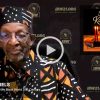
No meaningful strategies for endurable social change could be achieved in CARICOM without a full-blown embrace of authentic moral leadership says Dr Isaac Newton.
By Dr. Isaac Newton
BRIDGETOWN, Barbados, Nelson Mandela transcends death at 95. Between blessing and benediction there is heart -broken sorrow. But this is joyful sadness. There is irony too. The marvelous dignity with which death tiptoed in lingering leniency around his fragile health before it robbed us of his abiding presence and radiant smile spotlights indisputable reflection far too inadequate for celebration or critique.
His is a story of vivid pain and triumph, a quarter century of imprisonment and bubbling hope, and most admirably, an unpretentious humanity— plagued by admitted flaws and an unquenchable desire to overcome bones chilling weaknesses without offsetting his ethical authority.
I was introduced to Mandela by the late Tim Hector while I was still in high school in the small twin island state of Antigua and Barbuda. Tim commissioned me to dissect his struggles for political freedom. I was also tasked with analyzing the price he was paying behind bars to usher in a stable multiracial democracy for South Africa.
Mandela’s incredible self-sacrificial practices leap over the boundaries of this century into our eternal memories
I later studied Madiba’s leadership potency in a development and leadership class at Harvard Kennedy School of Government. Of all the world leaders Professor Robert I. Rotberg encouraged us to review; Mandela’s story was most inspiring. I grappled with the spiritual anchors that embraced his moral outlook while trying to grasp the consistent pragmatism that animated his quest for democracy. Although I didn’t think about it then, I see three lessons CARICOM leaders could glean from Mandela’s leadership.
Lesson One. He had an intuitive sense of history and a strategic selection of the right moment. He knew instinctively when to act, when to hold back, and most importantly, when to leave the seat of power. He did not allow himself to be doomed by the trappings of the office or to fall prey to short-term group-think about when is the best time to retire. Instead, he chose to be flexible to changing circumstances rather than be swept away by short-term interests.
Nothing or no one could have prevented Mandela from dying in office if he wanted too, especially after he led South Africa into a historic multiracial democracy in 1994. But because he was more concerned about a vision of national development bigger than himself, he opened the door for the younger generation to lead the country to an inclusive economic prosperity for all South Africans.

Lesson Two. He governed with an abounding national vision rooted in forgiveness and love. Mandela did not want the promise of a harmonious South Africa to be destroyed by the practice of tribal interests and partisan thinking. That’s why he did not permit his moral conscience to reward friends and punish enemies. Finger-pointing blame and vendetta politics were absence from his use of power. It was more important to embrace the enemy through reconciliatory methods than humiliate the adversary by inflicting an unending cycle of violence and counter violence. Mandela gave birth to an adorable social experiment where power and compassion were to cement a multiracial South Africa. In fact, his evolving collective sense of South African’s identity was illustrated when he used rugby– a symbol of hatred– to unify the country. Mandela operated with an all-embracing generosity. He sacrificed self-enrichment for national advancement.
Lesson Three. He embodied self-denial par excellence. Madiba gave up his own wants and managed personal impulses for the sake of the masses. By trading self-recognition for excellence in national progress, he crafted an environment of mutual trust, fearless self-control and selfless goodwill. It’s not coincidental that on the brink of Christmas—a season that reminds us of the greatest sacrifice ever made in human history by Jesus—Mandela’s incredible self-sacrificial practices leap over the boundaries of this century into our eternal memories. During his anti-apartheid struggle, 27 years of Robben Island Prison, and his presidency, Mandela demonstrated stunning self-mastery. Perhaps this was most acutely felt in the sacrificial offering of his family to the cause of freedom and the benevolence which he mirrored to his prison guards. With inspired conviction, Mandela showed that it is possible to transform cutthroat politics with charming humility and still deliver superlative outcomes.
I admire Mandela’s decency of consolidating power by finding common ground. Both his abiding faith in the human spirit, and a synergistic relationship between setback and struggles touch me profoundly.
No wonder stardom statesmanship is being bestowed upon this international figure of peace. Indeed, he is a game changing freedom fighter. If his legacy is to remain a rallying source of inspiration, it requires nerves and commitment to apply. Ultimately, no meaningful strategies for endurable social change could be achieved in CARICOM without a full-blown embrace of authentic moral leadership!
Dr. Isaac Newton is an International Leadership and Change Management Consultant and Political Adviser. He specializes in Government and Business Relations, and Sustainable Development Projects. Dr. Newton works extensively, in West Africa, the Caribbean and Latin America and is a graduate of Oakwood College, Harvard, Princeton and Columbia. He has published several books on personal development and written many articles on economics, education, leadership, political, social, and faith based issues.















